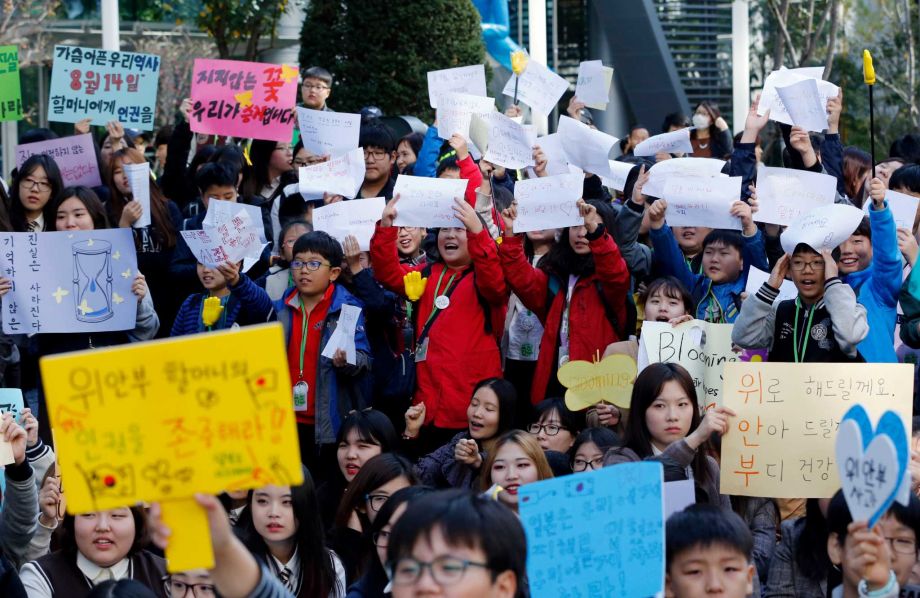- California Assembly OKs highest minimum wage in nation
- S. Korea unveils first graphic cigarette warnings
- US joins with South Korea, Japan in bid to deter North Korea
- LPGA golfer Chun In-gee finally back in action
- S. Korea won’t be top seed in final World Cup qualification round
- US men’s soccer misses 2nd straight Olympics
- US back on track in qualifying with 4-0 win over Guatemala
- High-intensity workout injuries spawn cottage industry
- CDC expands range of Zika mosquitoes into parts of Northeast
- Who knew? ‘The Walking Dead’ is helping families connect
Seoul, Tokyo bickering days away before 3-way summit with China

South Korean students hold signs during a rally demanding full compensation and apology for wartime sex slaves from Japanese government near the Japanese Embassy in Seoul, South Korea, Wednesday, Oct. 28, 2015. Only days before leaders from South Korea, Japan and China are to gather in Seoul this weekend, the event has still not yet been formally settled, with the South Korean and Japanese foreign ministries publicly dodging questions even as diplomats leak barbed tidbits to reporters behind the scenes. The problem this week, as is often the case in Northeast Asia, appears to be history, and specifically the inability of Seoul and Tokyo to settle disputes stemming from Japan’s brutal colonial rule of Korea in the early 20th century. The letters read “Apology and Live long and stay healthy.” (AP Photo/Lee Jin-man)
SEOUL, South Korea (AP) – Only days before leaders from South Korea, Japan and China are to gather in Seoul this weekend, the event has still not yet been formally settled, with the South Korean and Japanese foreign ministries publicly dodging questions even as diplomats leak barbed tidbits to reporters behind the scenes.
The bickering confounds some observers because even though these summits are often devoid of substance, there is high symbolic importance in leaders from these powerful neighbors putting aside their many differences and meeting. China and Japan are the world’s No. 2 and 3 biggest economies, respectively. South Korea and Japan are strong U.S. allies and Washington’s military and diplomatic bulwark in an unsteady region. All three have a keen interest in containing North Korea’s nuclear bomb ambitions.
The problem this week, as is often the case in Northeast Asia, appears to be history, and specifically the inability of Seoul and Tokyo to settle disputes stemming from Japan’s brutal colonial rule of Korea in the early 20th century.
This would be the first formal meeting at this level for Seoul and Tokyo in 3½ years. It also represents another step in Beijing’s slow resumption of exchanges with Japan following a fissure in relations in 2012 over Tokyo’s nationalization of uninhabited East China Sea islands controlled by Japan but claimed by China.
Seoul has proposed a separate bilateral meeting between South Korean President Park Geun-hye and Japanese Prime Minister Shinzo Abe on Monday, a day after they both meet with Chinese Premier Li Keqiang. But a Japanese government spokesman on Tuesday said he knew of no such proposal.
Newspapers in Japan report that Tokyo has yet to respond because it balks at Seoul’s pressure for Japan to make some sort of concession on the issue of Korean women forced into sex slavery by Japan’s military leading up to and during World War II. Many in South Korea feel that past Japanese apologies and attempts at recompense have fallen well short. This feeling has been compounded by a widespread view that the conservative Abe is whitewashing Japan’s wartime atrocities.
South Korean Ambassador to Japan Yoo Heung-soo, in a speech in Tokyo on Monday, urged Abe to make concessions on the issue when he meets with Park.
In response, Japanese Chief Cabinet Secretary Yoshihide Suga told reporters that “Japan’s position on the issue has not changed.” Suga didn’t say whether the topic would be raised in talks, but instead underlined the importance of the leaders meeting and talking.
Amid the wrangling, the Japanese point man on Korean affairs, Kimihiro Ishikane, met Tuesday with Lee Sang-duk, the Seoul Foreign Ministry’s top official on Northeast Asian affairs, on the sex slave issue. The outcome was unclear.
China and Japan have their own historical and territorial issues, but their rift began to heal last year with a diplomatic settlement and Chinese President Xi Jinping’s brief meeting with Abe in Beijing.
China’s good relations with Seoul are symbolized by President Park’s decision to break ranks with other democratic leaders to attend a lavish military parade in Beijing last month.
Rather than Xi, however, China will be represented in Seoul by the less influential Premier Li Keqiang. But Li has a focus on economics, and Beijing says it wants to revive stalled talks on a three-way trade deal between the sides.
The meetings could be significant even if the three leaders only manage to build confidence and agree to more summits, said Jeff Kingston, director of Asian studies at Temple University in Japan.
“They can focus on trade issues, security issues, and perhaps leave territorial and historical issues to the side for a moment,” he said. “Their relationships are far too important to neglect as they have.”












![일본 사도광산 [서경덕 교수 제공. 재판매 및 DB 금지]](http://www.koreatimesus.com/wp-content/uploads/2024/07/PYH2024072610800050400_P4-copy-120x134.jpg)



Pingback: U S Banks In Seoul South Korea | banks - topbanks
Pingback: Sex Scenes Secretary | Real Estat